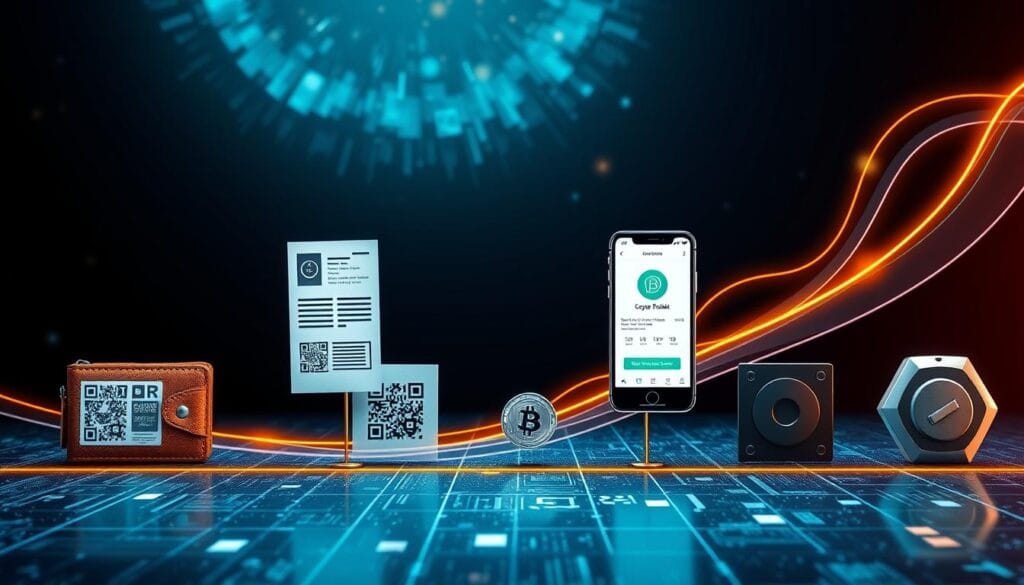What Is a Crypto Wallet?
The cryptocurrency world is growing fast, making safe storage more important than ever. Whether you’re new to investing or already know the ropes, learning about crypto wallets is necessary. A crypto wallet lets you control your money with just your hand, giving you a sense of security.
In this guide, we’ll explore what crypto wallets are and how they work. We aim to help you feel confident in handling your digital assets. Let’s venture into the fascinating world of cryptocurrency together.
Key Takeaways
- Crypto wallets are digital tools that store the public and private keys needed to manage your cryptocurrencies.
- These wallets don’t physically hold your digital assets; instead, they provide access to the public blockchain ledger.
- Cryptocurrencies are secured through blockchain technology, with wallets playing a crucial role in transaction authorization and asset management.
- Crypto wallets come in various forms, from software solutions to hardware devices and even paper-based options.
- Understanding the different types of wallets and their security features is key to safeguarding your digital assets.
Understanding Crypto Wallets and Their Purpose
Crypto wallets are key for handling digital assets. They connect users to the blockchain network, making transactions easy. They hold the keys to access your digital money, letting you send, receive, and check your balance.
Basic Functions of Digital Asset Storage
Crypto wallets don’t store the actual digital money. They keep the keys to access your assets on the blockchain. This lets users manage their digital money, track transactions, and keep an eye on their portfolios.
The Role in Cryptocurrency Management
Crypto wallets are vital for managing digital money. They let users control their assets, check balances, and send or receive money. They also help users use DeFi apps on the blockchain.
How Blockchain Technology Powers Wallets
Blockchain technology is the backbone of crypto wallets. It ensures transactions are secure and transparent. Each wallet has unique keys for signing and authorizing transactions on the blockchain.

Managing digital assets is impossible without crypto wallets. They help users securely store, transfer, and monitor their digital money. They play a significant role in decentralized finance (DeFi).
The Evolution of Cryptocurrency Storage Solutions
The world of cryptocurrency has seen big changes in how we store and manage digital assets. Since 2009, when Satoshi Nakamoto launched Bitcoin, the way we keep our cryptocurrencies has changed a lot. This change has been driven by the need for better security and ease of use.
The first Bitcoin wallet, Bitcoin-Qt, was a big step forward. It was the pioneer in diverging from the Bitcoin network. This led to many other wallets, each with its special features. These include Bitcoin XT, Bitcoin Unlimited, and Parity Bitcoin, all designed to meet different needs.
As the industry grew, so did the types of wallets available. Now, we have hot wallets for everyday use and cold wallets for keeping assets safe for a long time. Striking a balance between user-friendliness and security is crucial.
The global cryptocurrency wallet market was worth about $8.42 billion in 2022. It’s expected to grow by 24.8% each year until 2030. This shows how much people want safe and easy ways to store their digital money.
| Wallet Type | Key Features | Security Considerations |
|---|---|---|
| Hot Wallets |
|
|
| Cold Wallets |
|
|
The evolution of cryptocurrency storage solutions has focused on better security, working with other systems, DeFi, and keeping user data private. As more people use digital assets, the need for safe and easy wallets will keep growing. This will shape the future of cryptocurrency.

Key Components of a Crypto Wallet
Crypto wallets are key for managing and keeping your digital assets safe. They have important parts that help keep your money safe and easy to get. Let’s look at what makes a good cryptocurrency wallet.
Public Keys and Addresses
A crypto wallet starts with public-private key pairs. Your public key, or wallet address, is where others send you cryptocurrency. It’s like a special address on the blockchain network.
Private Keys and Security
Your private key is the secret code to your cryptocurrency. It’s like a digital signature that lets you send your money safely. Keeping your private key safe is very important, as anyone with it can take your money.
Digital Signatures and Transactions
Crypto wallets use cryptographic proof for safe transactions. When you send money, your wallet uses your private key to create a digital signature. This makes sure the transaction is real and keeps your money safe.
Seed phrases are a list of 12 to 24 key generation words. These wallets serve as backups for your private keys. They help you get back into your wallet and access your money if you lose it or need to recover it.
Knowing about the parts of a crypto wallet helps you handle digital assets better. It makes sure your cryptocurrency investments are safe and under your control.
Types of Hot Wallets for Active Trading
In the fast-paced world of cryptocurrency, hot wallets are a top pick for traders. They offer quick access to digital assets. This makes them perfect for those who trade often and manage their crypto daily.
Hot wallets are great because they work well with many exchanges and platforms. Zengo, Crypto.com DeFi Wallet, and Guarda support lots of digital assets. This lets users easily manage their portfolios. These wallets also offer staking, DeFi integration, and cold storage conversion, meeting the needs of today’s crypto fans.
But, hot wallets are online, which means they could face cyber threats. Exodus, Trust Wallet, and Coinbase Wallet are popular for their easy use and wide asset support. Still, users need to stay alert to keep their online web wallets and mobile wallets safe.
| Hot Wallet Service | Asset Support | Security Features |
|---|---|---|
| Zengo | Over 1,000 assets, staking/DeFi support | 4.8/5 rating, secure element chip |
| Crypto.com DeFi Wallet | Over 1,000 assets, staking/DeFi support | 3.9/5 rating, secure element chip |
| Guarda | Over 400,000 assets, cold storage conversion | Secure element chip, multi-signature support |
| Exodus | Around 300 assets, cold storage conversion | Secure storage, multi-coin support |
| Trust Wallet | Over 10 million assets, 100+ blockchains | Open-source, multi-signature support |
| Coinbase Wallet | Thousands of assets, staking/DeFi support | Secure storage, multi-coin support |
| MetaMask | Over 650,000 assets, custom token support | Open-source, multi-chain compatibility |
Hot wallets are great for quick trading, but they’re not without risks. Users must think about the balance between ease and safety. For safer, long-term storage, cold storage options like hardware and paper wallets might be better.
Cold Storage Solutions for Maximum Security
Cold storage solutions are the best way to keep your digital assets safe. They keep your private keys offline, away from potential internet threats. This protects them from cyber threats. By choosing hardware wallets or paper wallets, you can keep your cryptocurrency safe and secure.
Hardware Wallet Options
Hardware wallets provide secure offline storage for private keys. They support a multitude of cryptocurrencies, such as the BitBox02, which can handle over 1,500 different assets. Prices vary, from £50 for the KeepKey to £185 for the COLDCARD MK4.
The Cypherock X1 is versatile, supporting 9,000+ cryptocurrencies. The ELLIPAL Titan 2.0 offers top-notch protection for your digital assets.
Paper Wallet Generation
Paper wallets are a simple, effective way to store cryptocurrency offline. They print your private keys on paper, making them safe from digital threats. This method is free and keeps your assets safe, even if your device fails or gets hacked.
While paper wallets are less convenient than hardware wallets, they are reliable for protecting your digital wealth.
Offline Storage Best Practices
- Choose a reputable hardware wallet brand, such as Ledger, Trezor, or COLDCARD, to ensure the highest level of security.
- Securely store your paper wallet in a fire-resistant and waterproof location, such as a safe or a secure safety deposit box.
- Regularly check the condition of your hardware wallet and consider upgrading to newer models for enhanced security features.
- Familiarize yourself with the backup and recovery processes for your chosen cold storage solution to safeguard your assets in case of emergency.
Cold storage solutions offer enhanced peace of mind. Your cryptocurrency is safe from online threats. Whether you opt for a hardware or paper wallet, security is paramount for safeguarding your digital wealth.
Custodial vs Non-Custodial Wallet Solutions
Choosing between custodial and non-custodial wallets affects how you manage your digital assets. Each type of wallet has pros and cons, so knowing the differences helps you make an informed choice.
Custodial Wallets: Convenience at the Expense of Control
Custodial wallets are often used by cryptocurrency exchanges. They hold your private keys for you. This makes things easier, but you have to trust the service provider. These wallets are generally more secure due to regulatory compliance and potential insurance offerings. But, you sacrifice some control over your money.
Non-Custodial Wallets: Self-Custody and Complete Control
Non-custodial wallets let you control your private keys and digital assets. You’re in charge of keeping your funds safe. This freedom comes with significant responsibility.
With a non-custodial wallet, losing your private key means losing all your money. So, keeping your keys safe is crucial.
| Feature | Custodial Wallets | Non-Custodial Wallets |
|---|---|---|
| Private Key Management | The service provider holds and manages private keys | The user holds and manages private keys |
| Security | Regulated and insured, but vulnerable to data breaches | Highly secure, but user responsible for key management |
| Accessibility | Easier to use, with customer support for backup and recovery | Require more technical knowledge, but offer complete control |
| Connectivity | Require internet connection to operate | Can function both online and offline |
| Ideal Use Case | Beginners, frequent traders, and short-term storage | Tech-savvy users, long-term investors, and privacy advocates |
Deciding between custodial and non-custodial wallets depends on your priorities. Custodial wallets are great for those who want it easy. Non-custodial wallets are for those who want more control and security.
As crypto grows, new wallet types are coming out. They mix the best of both worlds. These new options aim to meet the needs of everyone in the crypto community.
Essential Security Features in Crypto Wallets
Keeping your cryptocurrency safe is very important. Crypto wallets have key security features to protect your digital money. These include two-factor authentication, strong backup and recovery options, and more. They help keep your wallet security, encryption, and recovery phrases safe.
Two-Factor Authentication Methods
Two-factor authentication (2FA) is a big deal for crypto wallet security. It adds an extra step to ensure only you can get into your wallet. You can use SMS codes, authenticator apps, or hardware tokens for 2FA.
Backup and Recovery Options
Keeping your private keys and recovery seed phrases safe is key. Hardware wallets, such as Ledger and Trezor, keep your assets offline. Paper wallets add extra protection. Always back up your recovery information and store it safely.
Protection Against Common Threats
Crypto wallets fight off threats like phishing, malware, and unauthorized access. Ensure your wallet software is up to date and use strong passwords. If you think your wallet is compromised, move your funds and check your account activity.
| Security Feature | Importance | Recommended Usage |
|---|---|---|
| Two-factor authentication (2FA) | Significantly reduces the risk of unauthorized access | Highly recommended for mobile, desktop, and exchange-linked wallets |
| Offline Storage (Hardware Wallets, Paper Wallets) | Provides the highest level of security for private keys and recovery phrases | Ideal for long-term storage and large amounts of cryptocurrency |
| Strong Passwords and Regular Updates | Protects against common threats like phishing and malware | Essential for all types of crypto wallets |
Using crypto wallet security features safeguards your digital assets. This way, you can enjoy the crypto world with more confidence and peace of mind.
Setting Up Your First Crypto Wallet
Starting your cryptocurrency journey involves setting up a secure wallet. It’s key for managing your digital assets. Whether you’re new or experienced, knowing how to set up a wallet is crucial.
You have many wallet options, like software, hardware, and custodial wallets. Each has its benefits. Think about what you need before choosing.
Software Wallets: Convenience and Accessibility
Software wallets like MetaMask and Trust Wallet are simple and easy to use. They work on your computer or phone. They’re great for beginners because they’re simple to set up.
You’ll need a strong password and a 12-24 word recovery phrase as a backup in case you lose your device.
Hardware Wallets: Maximum Security
Hardware wallets, such as Ledger Nano and Trezor, offer top security. Your private keys are kept offline, and protected from online threats. Setting one up involves a PIN code and a recovery phrase.
This ensures your cryptocurrency management is safe, even if the device is lost or damaged.
Custodial Wallets: Convenience for Beginners
Custodial wallets, found on exchanges like Binance, are easy for newbies. They’re managed by third parties, making setup simple. But, you lose ownership of your private keys. This convenience comes with a trade-off.
Security is key, no matter the wallet type. Use two-factor authentication, back up your recovery phrases, and ensure your device is always updated. This protects your digital assets.
Getting your first crypto wallet is exciting. Knowing about various wallet types helps you make an informed decision. This ensures you can securely store and manage your digital assets.
Managing Multiple Cryptocurrencies in One Wallet
More people are looking for ways to handle their multi-currency portfolio easily. Luckily, many crypto wallets now support lots of different cryptocurrencies. This lets users manage their cryptocurrency portfolio from one place.
Choosing the right crypto wallet is key. Look for one that supports a wide range of digital assets. This makes it easy to store, send, and keep an eye on different tokens and coins. It helps with asset diversification and makes managing your cryptocurrencies simpler.
Top wallet providers like Trust Wallet and Exodus let you create up to 15 wallets in one app. This makes it easy to organize and track different cryptocurrencies. Plus, they have strong security features like two-factor authentication and recovery phrase storage to keep your multi-currency wallets safe.
As the crypto market expands, the demand for multi-currency wallets will increase. By putting all your digital assets in one place, you can make managing your cryptocurrencies easier. This ensures you maximize the potential of your cryptocurrency portfolio
“Multichain wallets are essential for supporting various cryptocurrencies across different blockchain networks.”
Common Risks and How to Avoid Them
Exploring the world of cryptocurrency needs careful attention and a good grasp of risks. As the digital asset field grows, it’s key to protect your wallet security, private key protection, and crypto safety. Not doing so can result in losing valuable digital assets.
Security Vulnerabilities
Hacking and phishing attacks are big worries in crypto. Bad guys aim to find weak spots in hot wallets, where people trade cryptocurrencies. Keeping your digital assets safe from these threats is vital.
User Error Prevention
Another risk is losing access to your digital assets because of mistakes, like forgetting passwords or losing devices. Having a safe backup of your private key or seed phrase is crucial. It helps you get back in if you lose access.
Best Practices for Safe Storage
To lower these risks, follow best practices for crypto safety. Use strong passwords, turn on two-factor authentication, keep your wallet software up to date, and store your private keys or seed phrases safely. You can use a hardware wallet or other offline storage.
“Risk comes from not knowing what you’re doing.” – Warren Buffett
By using these safety measures, you can greatly reduce the chance of falling prey to hacking, phishing, or user mistakes. This ensures your digital assets stay safe and secure for the long haul.
Conclusion
Choosing the right crypto wallet is key to managing your digital assets safely. Look at the supported cryptocurrencies, fees, and how easy it is to use. Most importantly, check how secure it is.
The world of cryptocurrencies has grown, offering many storage options. You can pick from hot wallets for quick trading or cold storage for top security. Knowing the differences and security features helps you choose wisely.
Good wallet management is crucial. Keep your private keys safe and use two-factor authentication. This way, you can handle your crypto wallets confidently. It ensures your crypto wallet selection, digital asset security, and cryptocurrency management are safe for the long term.







